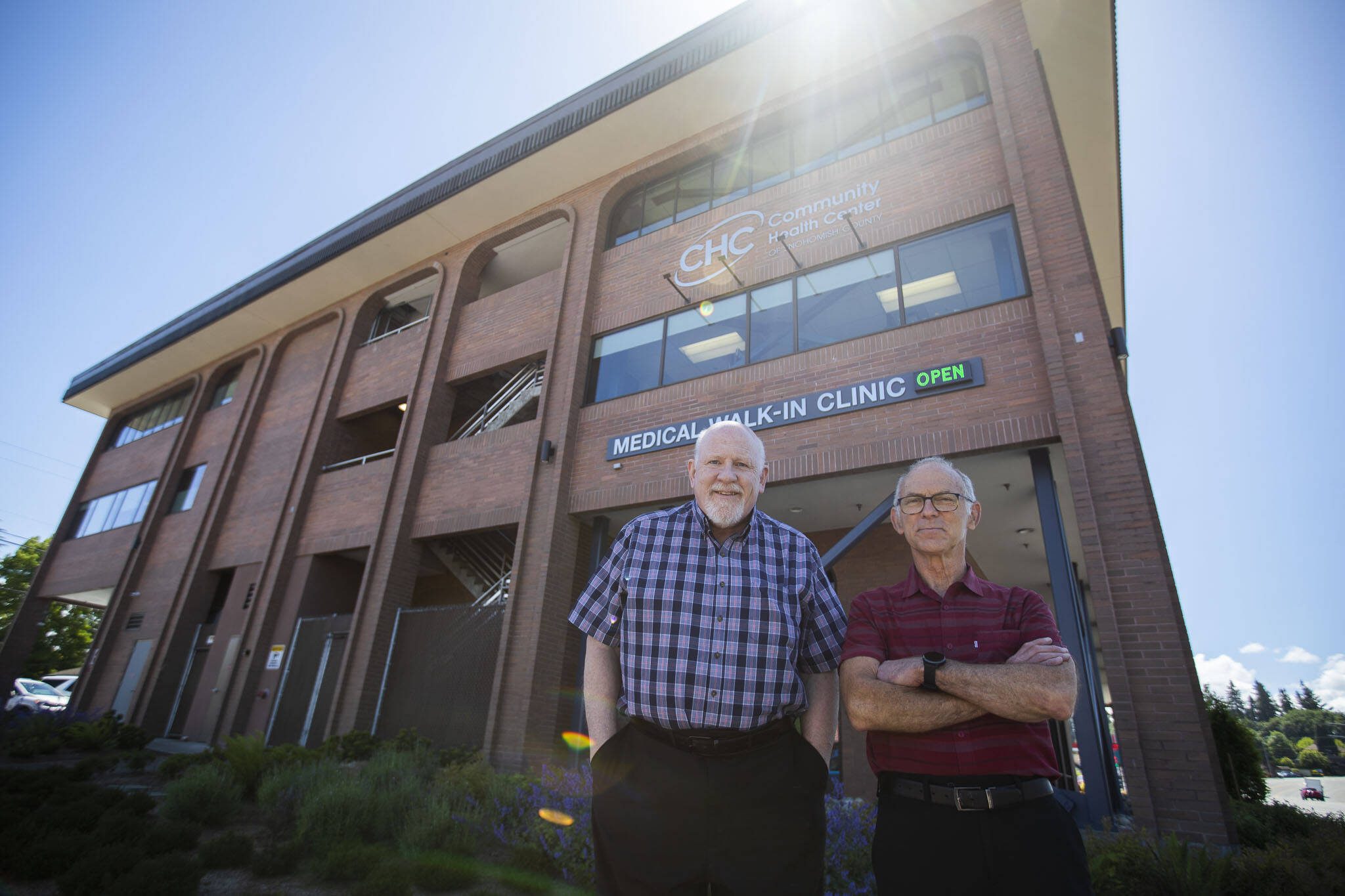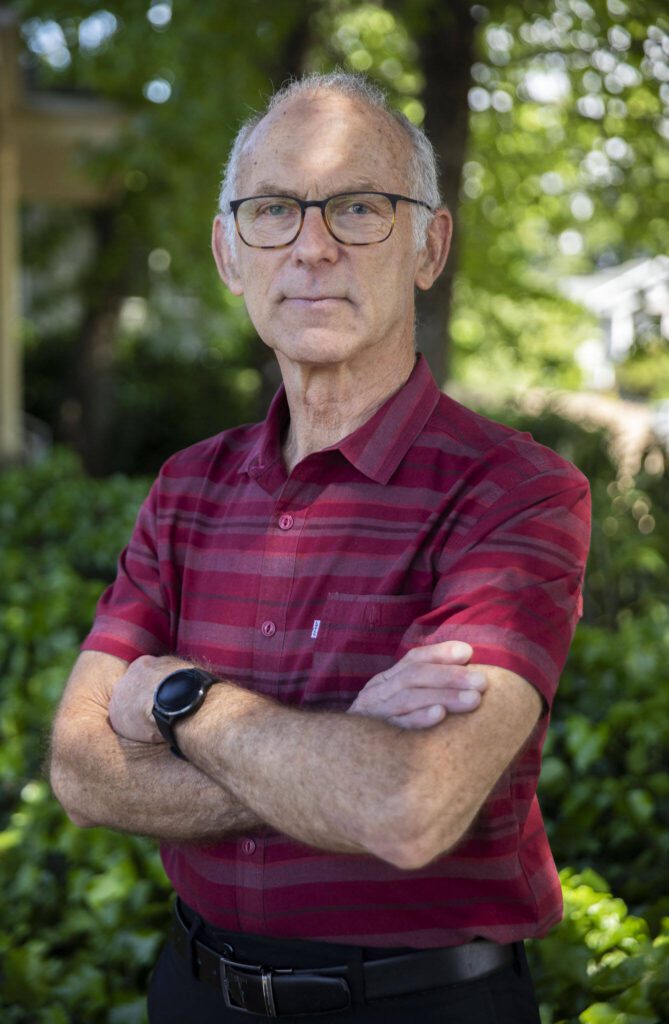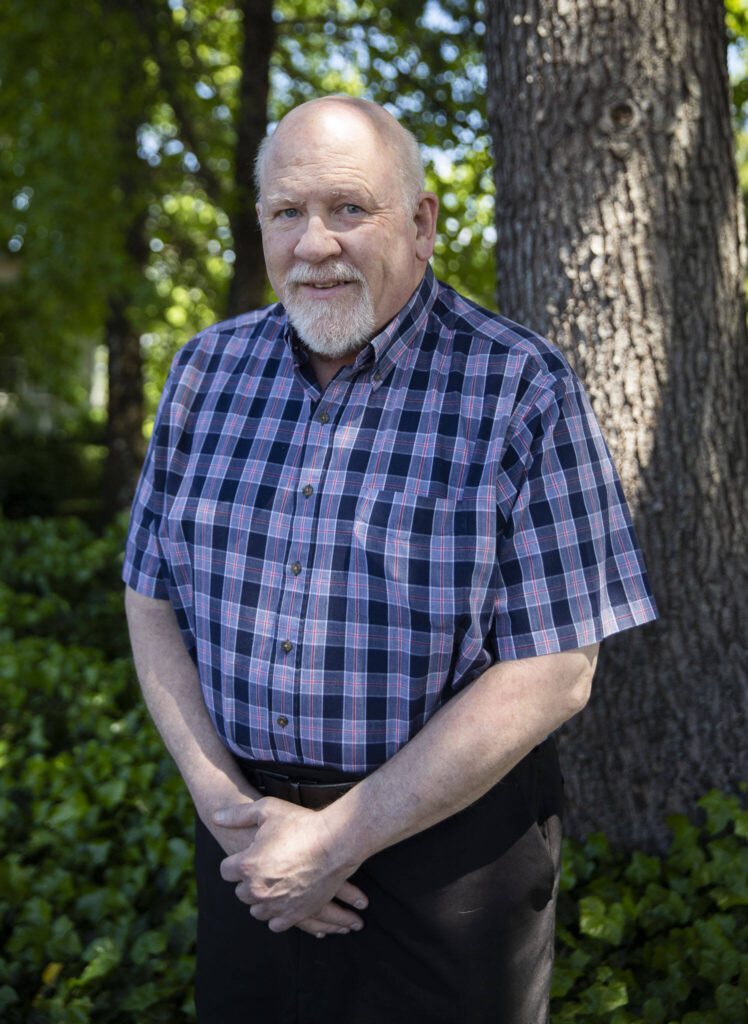EVERETT — Scott McAfee and Daniel Goodman are both doctors heading toward retirement. They want to go out with a bang.
McAfee, 67, and Goodman, 71, are two of about three dozen union doctors, nurse practitioners and physician assistants calling for changes at Community Health Center of Snohomish County, based in Everett. Since the pandemic, the center, like many clinics nationwide, has struggled with an influx of patients and lack of health care providers.
But qualms about some executive decisions by Joe Vessey, who became CEO in 2019, have made it harder for staff to stay, McAfee said. Management pressures providers to increase the number of patients they see per day, McAfee said, but with fewer workers and lower pay than other health care companies offer. High turnover in the center’s medical director position, a liaison between staff and executives, has been another red flag, Goodman said.
Vessey declined an interview.
Tax filings show Community Health Center of Snohomish County’s revenue and spending has increased since 2011. At the end of fiscal year 2023, the center was nearly $2 million in the red.
“The staff got the feeling we were rats getting off a sinking ship,” McAfee said. “The system seemed to be going downhill.”
In May, nearly one-quarter of the center’s 60 positions were open, Goodman said.
Community Health Center of Snohomish County is one of the state’s 28 federally qualified health centers and a member of the Washington Association for Community Health. Federally qualified health centers provide affordable access to integrated medical, behavioral, and oral health care. About 73% of the state’s health center patients are uninsured or on state insurance and about 88% of patients are at 200% of the federal poverty line or below.
Tensions at the center came to a head in fall 2022 when leadership fired a popular family doctor, Amy Bishop, “out of the blue,” McAfee said. Bishop, who also served on the board of directors, was known to speak out against leadership decisions she didn’t agree with.
“It was a big blow to the whole health care system,” McAfee said. “Nobody to this day is quite sure what exactly happened.”
Bishop declined to comment on her firing, citing legal reasons.
After the firing, staff wrote the clinic’s board of directors to request a formal investigation. But some providers were too afraid of retribution to sign their names on the letter, McAfee said, so the board declined the request.
Shook by the firing, staff voted 25-9 in March 2023 to join the Union of American Physicians and Dentists. They wanted a formal written system for disciplinary action, so it “couldn’t just be on the whim of the CEO,” McAfee said. But most of all, doctors at the center want more say in decisions that affect patient care.
“We remain fully committed to bargaining in good faith by engaging in productive negotiations,” the center’s spokesperson Karen Kirwin wrote, “and maintaining a healthy work environment as we work diligently to find common ground and reach an agreement that aligns with our mission and shared goals.”
In 2020, a majority of doctors in the United States worked outside of physician-owned medical practices, according to an American Medical Association analysis. That year marked the first in about a decade when more than half of physicians worked in private practices.
“Physicians over the last 30 years have gone from being providers to being commodities,” McAfee said. “We are the base of the health care system, but we don’t have a lot of say in how things are done.”
McAfee has worked at the health center for a decade. A doctor at the center’s walk-in urgent care department, he’s concerned about the center’s ability to triage emergency patients. When a patient checks in to the front desk at one of the center’s two urgent care sites, workers have no system to help determine if the patient’s condition is life-threatening.
“The patient is going to be put into a queue and wait with everybody else,” McAfee said.
Execs closed the urgent care walk-in on Sundays, and reduced the Saturday shift from two doctors to one. This has led to some “disastrous” days, McAfee said. One day, a provider working alone had to turn away 23 patients.
Doctors also want a say in the center’s electronic medical record system. The center uses Next Gen, a system Goodman said is cheap, slow and hard to work with. About 25% of physicians left when management switched to Next Gen from a more user-friendly system called Athena, Goodman said.
“We have this dollar store medical record system because it’s cheaper,” Goodman said. “But it’s so inefficient. We used to be driving a late model BMW, nice car, nice steering, we can get our jobs done. And somebody said, ‘Oh, no, that you can’t drive anymore, we’re gonna give you this other car. It’s got a stick shift, the windows rolled down. It has an AM radio.’”
Goodman has been a physician in Everett since 1986. He gave notice of his retirement earlier this month, and his last day is Aug. 23. He could have retired a while ago, he said, but he stayed because he loved taking care of his patients.
“When I first got there, I felt like this is an organization I would be totally comfortable leaving and having my patients continue care,” he said through tears. “I don’t feel that way anymore. I would say, ‘Get the hell out of that place. Any place that will take you, it will likely be better than this.’”
McAfee is also planning his retirement in the next few years.
“I’m at the tail end of my career,” he said. “I feel like I can leave something behind me if I can improve the system.”
Goodman and McAfee, both on the union’s bargaining committee, said they’ll stick around to help providers win their first contract, ideally by the end of the year. And while staff at the center are paid less than they would at other clinics, they said this fight is not about the money.
“It’s about being able to do our job,” Goodman said, “and being able to provide quality care for our patients.”
Correction: This story was adjusted to correct the number of Washington’s federally qualified health centers and patient demographics.
Sydney Jackson: 425-339-3430; sydney.jackson@heraldnet.com; Twitter: @_sydneyajackson.
Talk to us
> Give us your news tips.
> Send us a letter to the editor.
> More Herald contact information.



























